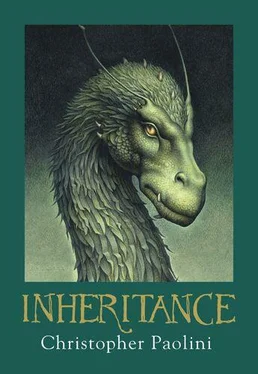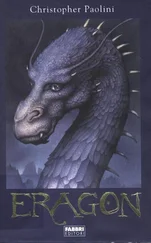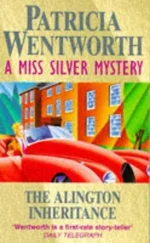The maneuver left Roran wholly exposed, however, and as he returned his attention to the five soldiers who remained on the walkway, he saw three of them aiming straight at his heart.
The soldiers fired.
Just before the bolts tore through him, they veered to the right and skittered across the blackened walls, like giant angry wasps.
Roran knew it was Carn who had saved him, and he resolved to find some way to thank the magician once they were no longer in mortal danger.
He charged the remaining soldiers and dispatched them with a furious volley of strikes, as if they were so many bent nails he was hammering down. Then he broke off the crossbow bolt that was sticking through his shield and turned to see how the battle below was progressing.
The last soldier on the docks crumpled to the blood-streaked floor at that very moment, and his head rolled away from his body and dropped into the canal, where it sank beneath a plume of bubbles.
Roughly two-thirds of the Varden had disembarked and were gathering in orderly ranks along the edge of the water.
Roran opened his mouth, intending to order them to move back from the canal-so that the men still on the barges had more room to get off-when the doors set into the left wall burst open and a horde of soldiers poured into the room.
Blast it! Where are they coming from? And how many are there?
Just as Roran started toward the stairs to help his men fend off the newcomers, Carn-who still stood at the head of the listing barges-raised his arms, pointed at the onrushing soldiers, and shouted a series of harsh, twisted words in the ancient language.
At his eldritch command, two sacks of flour and a single slab of slate flew off the barges and into the ranks of closely packed soldiers, cutting down over a dozen. The sacks burst open after the third or fourth impact, and clouds of ivory flour billowed out over the soldiers, blinding and choking them.
A second later, there was a flare of light next to the wall behind the soldiers, and a huge roiling fireball, orange and sooty, raced through the clouds of flour, devouring the fine powder with rapacious greed and producing a sound like a hundred flags flapping in a high wind.
Roran ducked behind his shield and felt searing heat against his legs and the bare skin of his cheeks as the fireball burned itself out only yards away from the walkway, glowing motes becoming ash that drifted downward: a black, charnel rain fitting only for a funeral.
Once the sullen glare had faded, he cautiously raised his head. A tendril of hot, foul-smelling smoke tickled his nostrils and stung his eyes, and with a start, he realized that his beard was on fire. He cursed and dropped his hammer and batted at the tiny grasping flames until he had extinguished them.
“Oi!” he shouted down at Carn. “You singed my beard! Be more careful, or I’ll have your head on a pike!”
Most of the soldiers lay curled on the ground, cupping their burned faces. Others were thrashing about with their clothes on fire or were flailing blindly in circles with their weapons, in an attempt to fend off any attacks by the Varden. Roran’s own men appeared to have escaped with only minor burns-most had been standing outside the radius of the fireball-although the unexpected conflagration had left them disoriented and unsteady.
“Stop gaping like fools and get after those groping rascals before they regain their senses!” he ordered, banging his hammer against the railing to ensure that he had their attention.
The Varden heavily outnumbered the soldiers, and by the time Roran reached the bottom of the stairs, they had already put to death fully three-quarters of the defending force.
Leaving the disposal of the few remaining soldiers to his more-than-able warriors, Roran made his way toward the large double doors to the left of the canal-doors wide enough for two wagons to drive through abreast. As he did, he came upon Carn, who was sitting at the base of the crane’s platform, eating out of a leather pouch he always carried. The pouch, Roran knew, contained a mixture of lard, honey, powdered beef liver, lamb’s heart, and berries. The one time Carn had given him a piece, he had gagged-but even a few bites could keep a man on his feet for a whole day’s worth of hard work.
To Roran’s concern, the magician looked utterly exhausted. “Can you continue?” Roran asked, pausing by him.
Carn nodded. “I just need a moment.… The bolts in the tunnel, and then the sacks of flour and the piece of slate …” He pushed another morsel of food in his mouth. “It was a bit much all at once.”
Reassured, Roran started to move away, but Carn caught him by the arm. “I didn’t do it,” he said, and his eyes crinkled with amusement. “Singe your beard, that is. The torches must have started the fire.”
Roran grunted, and continued on to the doors. “Form up!” he shouted, and slapped his shield with the flat of his hammer. “Baldor, Delwin, you take the lead with me. The rest of you, line up behind us. Shields out, swords drawn, arrows nocked. Halstead probably doesn’t know yet that we’re in the city, so don’t let anyone escape who could warn him.… Ready, then? Right, with me!”
Together he and Baldor-whose cheeks and nose were red from the explosion-unbarred the doors and threw them open, revealing the interior of Aroughs.
Dozens of large plaster-sided buildings stood clustered around the portal in the city’s outer wall, where the canal entered Aroughs. All of the buildings-cold and forbidding with the empty stare of their black windows-appeared to be warehouses or storage facilities, which, coupled with the early-morning hour, meant it was unlikely that anyone had noticed the Varden’s clash with the guards.
Roran had no intention of staying around to find out for sure.
Hazy rays of newborn light streaked horizontally across the city, gilding the tops of the towers, the battlements, the cupolas, and the slanted roofs. The streets and alleyways were cloaked in shadows the color of tarnished silver, and the water in its stone-lined channel was dark and dismal and laced with streaks of blood. High above gleamed a lone wandering star, a furtive spark in the brightening blue mantle, where the sun’s growing radiance had obscured all of the other nighttime jewels.
Forward the Varden trotted, their leather boots scuffing against the cobblestone street.
Off in the distance, a cock crowed.
Roran led them through the warren of buildings toward the inner wall of the city, but not always choosing the most obvious or direct route, so as to reduce their chances of encountering someone in the streets. The lanes they followed were narrow and murky, and sometimes he had difficulty seeing where he was placing his feet.
Filth clotted the gutters of the streets. The stench filled him with loathing and made him wish for the open fields he was used to.
How can anyone bear to live in such conditions? he wondered. Even pigs won’t wallow in their own dirt .
Away from the curtain wall, the buildings changed to houses and shops: tall, crossbeamed, with whitewashed walls and wrought-iron fixtures upon the doors. Behind the shuttered windows, Roran sometimes heard the sound of voices, or the clatter of dishes, or the scrape of a chair being pulled across a wooden floor.
We’re running out of time , he thought. Another few minutes and the streets would be teeming with the denizens of Aroughs.
As if to fulfill his prediction, two men stepped out of an alleyway in front of the column of warriors. Both of the city dwellers carried yokes on their shoulders with buckets of fresh milk hanging off the ends.
The men stopped with surprise as they saw the Varden, the milk sloshing out of the buckets. Their eyes widened, and their mouths fell open in preparation of some exclamation.
Читать дальше





![Christopher Paolini - Brisingr [en]](/books/195528/christopher-paolini-brisingr-en-thumb.webp)
![Christopher Paolini - Eldest [en]](/books/223279/christopher-paolini-eldest-en-thumb.webp)
![Christopher Paolini - Eragon [en]](/books/248440/christopher-paolini-eragon-en-thumb.webp)




